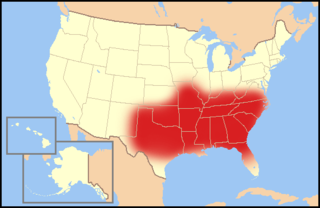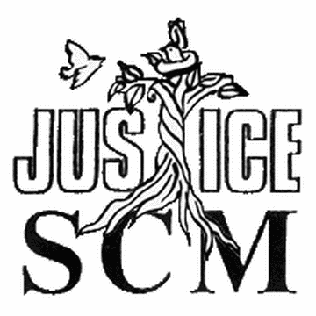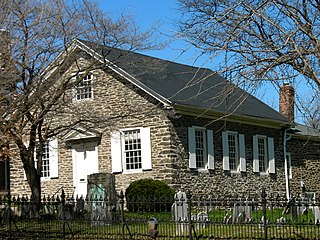Related Research Articles
Evangelicalism, also called evangelical Christianity or evangelical Protestantism, is a worldwide interdenominational movement within Protestant Christianity that emphasises the preaching of the gospel. It affirms the centrality of being "born again," in which an individual experiences personal conversion; the authority of the Bible as God's revelation to humanity; and spreading the Christian message. The word evangelical comes from the Greek (euangelion) word for "good news".

The Second Great Awakening was a Protestant religious revival during the early 19th century in the United States. The Second Great Awakening, which spread religion through revivals and emotional preaching, sparked a number of reform movements. Revivals were a key part of the movement and attracted hundreds of converts to new Protestant denominations. The Methodist Church used circuit riders to reach people in frontier locations.
The Christian right, or the religious right, are Christian political factions which are characterized by their strong support of socially conservative and traditionalist policies. Christian conservatives seek to influence politics and public policy with their interpretation of the teachings of Christianity.
The Third Great Awakening refers to a historical period proposed by William G. McLoughlin that was marked by religious activism in American history and spans the late 1850s to the early 20th century. It influenced pietistic Protestant denominations and had a strong element of social activism. It gathered strength from the postmillennial belief that the Second Coming of Christ would occur after mankind had reformed the entire Earth. It was affiliated with the Social Gospel movement, which applied Christianity to social issues and gained its force from the awakening, as did the worldwide missionary movement. New groupings emerged, such as the Holiness movement and Nazarene and Pentecostal movements, and also Jehovah's Witnesses, Spiritualism, Theosophy, Thelema, and Christian Science. The era saw the adoption of a number of moral causes, such as the abolition of slavery and prohibition.

The Bible Belt is a region of the Southern United States and one Midwestern state, the state of Missouri, in all of which socially conservative Protestant Christianity plays a strong role in society. Church attendance across the denominations is generally higher than the nation's average. The region contrasts with the religiously diverse Midwest and Great Lakes, and the Mormon corridor in Utah and southern Idaho.
Religion in Canada is rapidly declining, although it has been historically dominated by Christianity. The constitution of Canada refers to God and the monarch carries the title of Defender of the Faith, however Canada has no official church and the government is officially committed to religious pluralism. Freedom of religion in Canada is a constitutionally protected right, allowing individuals to assemble and worship without limitation or interference.
Parachurch organizations are Christian faith-based organizations that work outside and across denominations to engage in social welfare and evangelism. Parachurch organizations seek to come alongside the church and specialize in things that individual churches may not be able to specialize in by themselves. They often cross denominational and national boundaries providing specialized services and training.
The Social Gospel is a social movement within Protestantism that aims to apply Christian ethics to social problems, especially issues of social justice such as economic inequality, poverty, alcoholism, crime, racial tensions, slums, unclean environment, child labor, lack of unionization, poor schools, and the dangers of war. It was most prominent in the early 20th-century United States and Canada. Theologically, advocates of the movement sought to put into practice the Lord's Prayer : "Thy kingdom come, Thy will be done on earth as it is in heaven". They typically were postmillennialist; that is, they believed the Second Coming could not happen until humankind rid itself of social evils by human effort. The Social Gospel was more popular among clergy than laity. Its leaders were predominantly associated with the liberal wing of the progressive movement, and most were theologically liberal, although a few were also conservative when it came to their views on social issues. Important leaders included Richard T. Ely, Josiah Strong, Washington Gladden, and Walter Rauschenbusch.

The mainline Protestant churches are a group of Protestant denominations in the United States and in some cases Protestant denominations in Canada largely of the theologically liberal or theologically progressive persuasion that contrast in history and practice with the largely theologically conservative Evangelical, Fundamentalist, Charismatic, Confessional, Confessing Movement, historically Black church, and Global South Protestant denominations and congregations. Some make a distinction between "mainline" and "oldline", with the former referring only to denominational ties and the latter referring to church lineage, prestige and influence. However, this distinction has largely been lost to history and the terms are now nearly synonymous.
Progressive Christianity represents a postmodern theological approach, and is not necessarily synonymous with progressive politics. It developed out of the liberal Christianity of the modern era, which was rooted in the Enlightenment's thinking. Progressive Christianity is a postliberal theological movement within Christianity that, in the words of Reverend Roger Wolsey, "seeks to reform the faith via the insights of post-modernism and a reclaiming of the truth beyond the verifiable historicity and factuality of the passages in the Bible by affirming the truths within the stories that may not have actually happened."

James E. Wallis Jr. is an American theologian, writer, teacher and political activist. He is best known as the founder and editor of Sojourners magazine and as the founder of the Washington, D.C.-based Christian community of the same name. In 2021, Wallis joined Georgetown University as the inaugural Archbishop Desmond Tutu Chair in Faith and Justice. He also leads the Center on Faith and Justice at Georgetown. Wallis is known for his advocacy on issues of peace and social justice. Although Wallis actively eschews political labels, he describes himself as an evangelical and is often associated with the evangelical left and the wider Christian left. He worked as a spiritual advisor to President Barack Obama. He is also a leader in the Red-Letter Christian movement.

The Student Christian Movement of Canada is a youth-led ecumenical network of student collectives based in spirituality, issues of social, economic justice, environmental justice, and building autonomous local communities on campuses across the country. It is part of the World Student Christian Federation. The SCM Canada works with other Christian groups, for example, in 2017 supporting the Week of Prayer for Christian Unity.
The Evangelical left is a Christian left movement in Evangelical Christianity that affirms conservative evangelical theology and are politically progressive. It is mainly based in the US, but is also found in Latin America.
Red-Letter Christians is a non-denominational movement within Evangelical Christianity. "Red-Letter" refers to New Testament verses and parts of verses printed in red ink, to indicate the words attributed to Jesus without the use of quotations.
The Federal Council of Churches, officially the Federal Council of Churches of Christ in America, was an ecumenical association of Christian denominations in the United States in the early twentieth century. It represented the Anglican, Baptist, Eastern Orthodox, Lutheran, Methodist, Moravian, Oriental Orthodox, Polish National Catholic, Presbyterian, and Reformed traditions of Christianity. It merged with other ecumenical bodies in 1950 to form the present day National Council of Churches.

Sojourners is a progressive monthly magazine and daily online publication of the American Christian social justice organization Sojourners, which arose out of the Sojourners Community. It was first published in 1971 under the original title of The Post-American. The magazine and online publication feature reporting, commentary, and analysis on Christianity and politics, the church and social issues, social justice, and Christian living. Articles frequently feature coverage of fair trade, interfaith dialogue, peacemaking, and work to alleviate poverty. The offices of the magazine are in Washington, D.C.

Christianity is the most prevalent religion in the United States. Estimates from 2021 suggest that of the entire U.S. population about 63% is Christian. The majority of Christian Americans are Protestant Christians, though there are also significant numbers of American Roman Catholics and other Christian denominations such as Latter-day Saints, Orthodox Christians and Oriental Orthodox Christians, and Jehovah's Witnesses. The United States has the largest Christian population in the world and, more specifically, the largest Protestant population in the world, with nearly 210 million Christians and, as of 2021, over 140 million people affiliated with Protestant churches, although other countries have higher percentages of Christians among their populations. The Public Religion Research Institute's "2020 Census of American Religion", carried out between 2014 and 2020, showed that 70% of Americans identified as Christian during this seven-year interval. In a 2020 survey by the Pew Research Center, 65% of adults in the United States identified themselves as Christians. They were 75% in 2015, 70.6% in 2014, 78% in 2012, 81.6% in 2001, and 85% in 1990. About 62% of those polled claim to be members of a church congregation.

Diana Butler Bass is an American historian of Christianity and an advocate for progressive Christianity. She is the author of eleven books.

In the United States, evangelicalism is a movement among Protestant Christians who believe in the necessity of being born again, emphasize the importance of evangelism, and affirm traditional Protestant teachings on the authority as well as the historicity of the Bible. Comprising nearly a quarter of the U.S. population, evangelicals are a diverse group drawn from a variety of denominational backgrounds, including Baptist, Mennonite, Methodist, Pentecostal, Plymouth Brethren, Quaker, Reformed and nondenominational churches.
Milton Arthur Galamison was a Presbyterian minister who served in Brooklyn, New York. As a community activist, he championed integration and education reform in the New York City public school system, and organized two school boycotts.
References
Notes
Bibliography
- Bivins, Jason (2003). The Fracture of Good Order: Christian Antiliberalism and the Challenge to American Politics. Chapel Hill, North Carolina: University of North Carolina Press.
- Gasaway, Brantley W. (2014). Progressive Evangelicals and the Pursuit of Social Justice. Chapel Hill, North Carolina: University of North Carolina Press.
- Miller, Timothy (1999). The 60s Communes: Hippies and Beyond. Syracuse, New York: Syracuse University Press. ISBN 978-0-8156-0601-7.
- Swartz, David (2012). Moral Minority: the Evangelical Left in an Age of Conservatism. Politics and Culture in Modern America. Philadelphia: University of Pennsylvania Press.